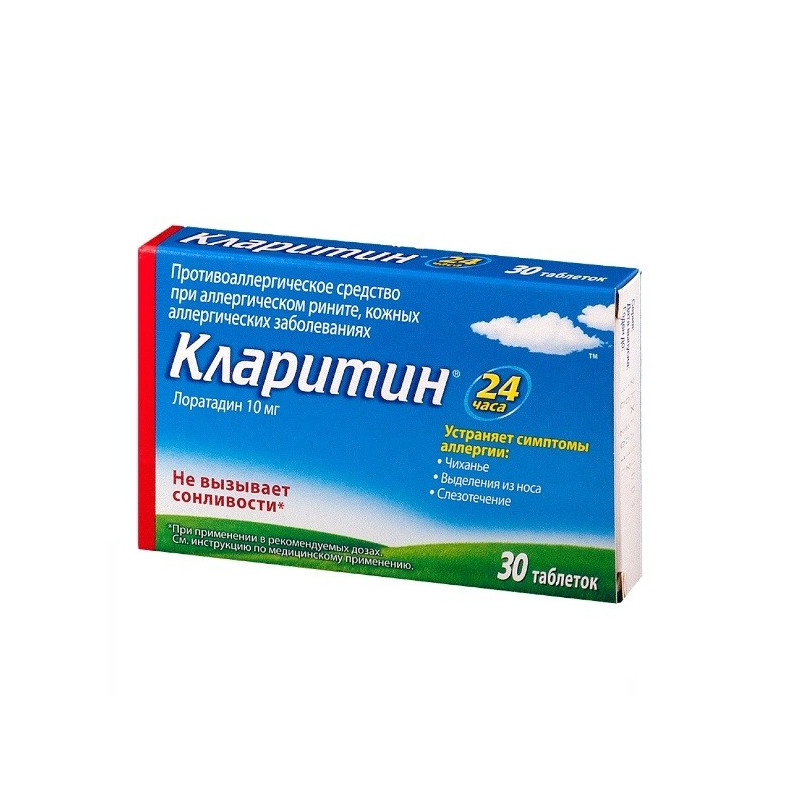



 All payments are encrypted via SSL
All payments are encrypted via SSL
 Full Refund if you haven't received your order
Full Refund if you haven't received your order
- Seasonal (pollinosis) and year-round allergic rhinitis and allergic conjunctivitis (to eliminate the symptoms associated with these diseases - sneezing, itching of the nasal mucosa, rhinorrhea, burning sensation and itching in the eyes, tearing);
- Chronic idiopathic urticaria;
- skin diseases of allergic origin.
The drug is prescribed by mouth, regardless of the meal.
Adults (including elderly patients) and adolescents over the age of 12 It is recommended to take Claritin in a dose of 10 mg (1 tab. or 2 teaspoons / 10 ml / syrup) 1 time / day.
Children aged 2 to 12 years dose of Claritin is recommended to be prescribed depending on body weight: when body weight less than 30 kg - 5 mg (1/2 tab. Or 1 tsp. / 5 ml / syrup) 1 time / day, with body weight 30 kg and more - 10 mg (1 tab. Or 2 teaspoons / 10 ml / syrup) 1 time / day.
For adults and children weighing more than 30 kg with severe liver dysfunction the initial dose is 10 mg (1 tab. or 2 teaspoons / 10 ml / syrup) every other day, with a body weight of 30 kg or less - 5 mg (1 tsp / 5 ml / syrup) every other day.
Have elderly patients and u patients with chronic renal failure dose adjustment is not required.
In clinical studies
In clinical studies involving children aged 2 to 12 years who took the drug Claritin®, more often than in the placebo group, headache (2.7%), nervousness (2.3%), fatigue (1%) were observed.
Nervous system: in children aged 2 to 12 years - headache (2.7%), nervousness (2.3%), fatigue (1%); in adults, headache (0.6%), drowsiness (1.2%), insomnia (0.1%).
Gastrointestinal: in adults, increased appetite (0.5%).
In post-marketing period
Nervous system: very rarely (<1/10 000) - dizziness, fatigue.
Gastrointestinal: very rarely (<1/10 000) - dry mouth, gastrointestinal disorders (nausea, gastritis), abnormal liver function.
Allergic reactions: very rarely (<1/10 000) - rash, anaphylaxis.
Cardiovascular: very rarely (<1/10 000) - palpitations, tachycardia.
From the skin: very rarely (<1/10 000) - alopecia.
- age up to 2 years (for syrup);
- age up to 3 years (for tablets);
- lactation period (breastfeeding);
- rare hereditary diseases (violations of the tolerance of galactose, lapp lactase deficiency or glucose-galactose malabsorption) - due to the presence of lactose, which is part of the tablets;
- deficiency of sucrase / isomaltase, fructose intolerance, glucose-galactose malabsorption - due to the presence of sucrose, which is part of the syrup;
- hypersensitivity to the drug.
WITH caution It should be prescribed to patients with severely impaired liver function, during pregnancy.
Use during pregnancy and lactation
The safety of loratadine during pregnancy has not been established. Use of the drug Claritin® during pregnancy is possible only if the intended benefit to the mother outweighs the potential risk to the fetus.
Loratadine and its active metabolite are excreted in breast milk, so when prescribing the drug during lactation, the question of discontinuing breastfeeding should be resolved.
Application for violations of the liver
To use the drug with caution in liver failure: the initial dose should be 10 mg (1 tab. Or 2 teaspoons / 10 ml / syrup) every other day.
Application for violations of kidney function
For patients with renal insufficiency, the initial dose should be 10 mg (1 tab. Or 2 teaspoons / 10 ml / syrup) every other day.
Contraindications: age up to 2 years (for syrup); age up to 3 years (for tablets).
Children aged 2 to 3 years are recommended to take the drug Claritin® in the form of syrup.
Taking the drug Claritin® should be discontinued 48 hours before skin tests, as antihistamine medications may distort the results of a diagnostic study.
Use in pediatrics
Children aged 2 to 3 years taking the drug Claritin is recommended® in the form of syrup.
Influence on ability to drive motor transport and control mechanisms
No negative effect of Claritin® on the ability to drive a car or to carry out other activities requiring increased concentration of attention. However, in very rare cases, some patients experience drowsiness while taking the drug Claritin®, which can affect their ability to drive vehicles and work with mechanisms.
Symptoms: drowsiness, tachycardia, headache.
Treatment: gastric lavage, taking adsorbents (powdered Activated carbon with water), symptomatic and supportive therapy. Loratadine is not excreted by hemodialysis. After providing emergency care, it is necessary to continue monitoring the patient's condition.
Claritin® does not enhance the effect of ethanol (alcohol) on the central nervous system.
When co-administered with Claritin with Ketoconazole, Erythromycin or cimetidine, there was an increase in the concentration of loratadine in the plasma, but this increase was not clinically significant, incl. according to ECG.
Pharmacy sales terms
The drug is approved for use as a means of OTC.
Terms and conditions of storage
The drug should be stored out of the reach of children at a temperature not higher than 25 ° C.
